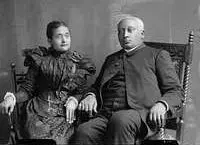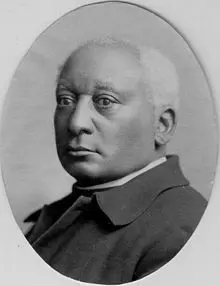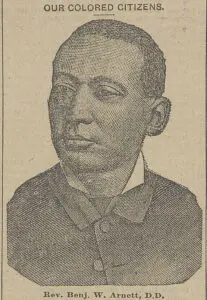Benjamin W. Arnett

Benjamin Arnett, a free man, received his education in a one-room schoolhouse in Brownsville, Pennsylvania. In 1858, when he was 20 years old, doctors amputated his leg. Some sources attribute the amputation to a tumor, while others claim it resulted from an injury sustained while working on a steamboat. Nonetheless, that same year, he married Mary Louise Gordon, earned his teaching certificate, and began his career as an educator.
In 1865, Arnett became licensed to preach in the AME church., which brought him to Cincinnati, where he was a pastor of Allen Temple. Rev. Arnette accepted an appointment within the AME church, which relocated his family to Wilberforce in 1885.

A skilled political orator, Arnette was elected to the Ohio House representing Greene County. In the two years he served (1886-1887), Arnett introduced legislation to repeal the state’s “Black Laws of 1804 and 1807,” designed to limit African American residents’ freedom, rights, and economic prosperity.
For more than 80 years, African American and mulatto Ohioans were required to prove that they were not slaves and find at least two people who would guarantee a surety of $500 for their good behavior.
Other restrictions included the right to vote or testify against white people in trials. Ohio’s Black Laws also limited African Americans’ rights to marry whites, gun ownership, quality education, and other opportunities afforded to white residents.
Related Article: The History of African Americans in Cincinnati

Ohio’s Black Laws were repealed in 1887, leading to the desegregation of schools throughout the state.
After leaving office, Arnett remained influential in Republican politics, thanks, in part, to his friendship with a fellow legislator (and later president), William McKinley.
Arnett died at Wilberforce University in 1906.
Sources
19th Century Black Cincinnatians you should know | Cincinnati & Hamilton County Public Library (cincinnatilibrary.org)
Benjamin W. Arnett, Jr. | Ohio Statehouse
Benjamin W. Arnett – Wikipedia
Black Laws of 1807 – Ohio History Central
(1804) Ohio Black Codes (blackpast.org)
About The First 28
The First 28, graciously sponsored by the Greater Cincinnati Foundation, celebrates Black Cincinnatians who were the first in their fields. Each day during Black History Month, we will celebrate athletes, artists, business leaders, civil rights activists, educators, physicians, and politicians.
The Voice of Black Cincinnati is a media company designed to educate, recognize, and create opportunities for African Americans. Want to find local news, events, job postings, scholarships, and a database of local Black-owned businesses? Visit our homepage, explore other articles, subscribe to our newsletter, like our Facebook page, join our Facebook group, and text VOBC to 513-270-3880.
Images provided by Wikipedia, Cincinnati Public Library, picryl.com
Comments are closed.